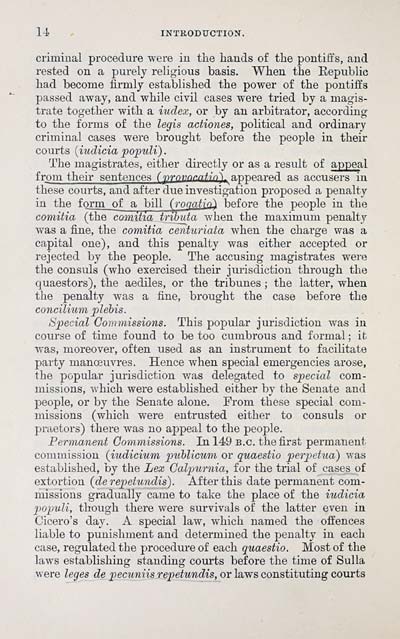Download files
Complete book:
Individual page:
Thumbnail gallery: Grid view | List view

14 INTRODTJCTION.
crimiual procedure were iu tlie laauds of the pontiffs, and
rested on a purely religious basis. When the Eepublic
had become firmly established the power of the poutiifs
passed away, aud while civil cases were tried by a magis-
trate together with a iudex, or by an arbitrator, accordiug
to the forms of the legis actiones, political aud ordinary
crimiual cases were brought before the people iu their
courts {iudicia populi) .
The magistrates, either directly or as a result of appea l
f rpm their senteu cpis (yi|-n7)n/r/7i7'r))^ apppn.vp.d as accusers in
these courts, aud after due investigatiou proposed a peualty
in the f orm of a bill Crnqatial before the people iu the
comitia (the comitia tributa wheu the maximum peualty
was a fiue, the comitia centuriata when the charge was a
capital oue), aud this penalty was either accepted or
rejected by the people. The accusiug magistrates were
the consuls (who exercised their jurisdictiou through the
quaestors), the aediles, or the tribunes ; the latter, when
the penalty was a fiue, bronght the case before the
concilium plebis.
Special Comniissions. This popular jurisdiction was in
conrse of time found to be too cumbrous aud formal ; it
was, moreover, often used as au iustrument to facilitate
party mauoeuvres. Heuce when special emergencies arose,
the popular jurisdiction was delegated to special com-
missious, which were estabhshed either by the Seuate aud
people, or by the Seuate alone. From these special com-
missious (which were eutrusted either to cousuls or
praetors) there was uo appeal to the people.
Permanent Commissions. In 149 b.c. thefirst permauent
commission (iudicium publicum or quaestio perj^etua) was
established, by the Lex Galpurnia, for the ti-ial of cases of
extortiou (derepetundis). Afterthis date permaueut com-
missious gradually came to take the place of the iudicia
populi, though there were survivals of the latter eveu in
Cicero's day. A special law, which uamed the offences
liable to puuisliment and determined the peualty iu each
case, regulated the procedure of each quaesiio. Most of the
laws establishiug standing courts before the time of Sulla
were leges de pecuniis repetundis, or laws constituting courts
crimiual procedure were iu tlie laauds of the pontiffs, and
rested on a purely religious basis. When the Eepublic
had become firmly established the power of the poutiifs
passed away, aud while civil cases were tried by a magis-
trate together with a iudex, or by an arbitrator, accordiug
to the forms of the legis actiones, political aud ordinary
crimiual cases were brought before the people iu their
courts {iudicia populi) .
The magistrates, either directly or as a result of appea l
f rpm their senteu cpis (yi|-n7)n/r/7i7'r))^ apppn.vp.d as accusers in
these courts, aud after due investigatiou proposed a peualty
in the f orm of a bill Crnqatial before the people iu the
comitia (the comitia tributa wheu the maximum peualty
was a fiue, the comitia centuriata when the charge was a
capital oue), aud this penalty was either accepted or
rejected by the people. The accusiug magistrates were
the consuls (who exercised their jurisdictiou through the
quaestors), the aediles, or the tribunes ; the latter, when
the penalty was a fiue, bronght the case before the
concilium plebis.
Special Comniissions. This popular jurisdiction was in
conrse of time found to be too cumbrous aud formal ; it
was, moreover, often used as au iustrument to facilitate
party mauoeuvres. Heuce when special emergencies arose,
the popular jurisdiction was delegated to special com-
missious, which were estabhshed either by the Seuate aud
people, or by the Seuate alone. From these special com-
missious (which were eutrusted either to cousuls or
praetors) there was uo appeal to the people.
Permanent Commissions. In 149 b.c. thefirst permauent
commission (iudicium publicum or quaestio perj^etua) was
established, by the Lex Galpurnia, for the ti-ial of cases of
extortiou (derepetundis). Afterthis date permaueut com-
missious gradually came to take the place of the iudicia
populi, though there were survivals of the latter eveu in
Cicero's day. A special law, which uamed the offences
liable to puuisliment and determined the peualty iu each
case, regulated the procedure of each quaesiio. Most of the
laws establishiug standing courts before the time of Sulla
were leges de pecuniis repetundis, or laws constituting courts
Set display mode to: Large image | Transcription
Images and transcriptions on this page, including medium image downloads, may be used under the Creative Commons Attribution 4.0 International Licence unless otherwise stated. ![]()
| Early Gaelic Book Collections > Matheson Collection > Pro S. Roscio Amerino > (22) |
|---|
| Permanent URL | https://digital.nls.uk/76502574 |
|---|
| Description | Items from a collection of 170 volumes relating to Gaelic matters. Mainly philological works in the Celtic and some non-Celtic languages. Some books extensively annotated by Angus Matheson, the first Professor of Celtic at Glasgow University. |
|---|
| Description | Selected items from five 'Special and Named Printed Collections'. Includes books in Gaelic and other Celtic languages, works about the Gaels, their languages, literature, culture and history. |
|---|

